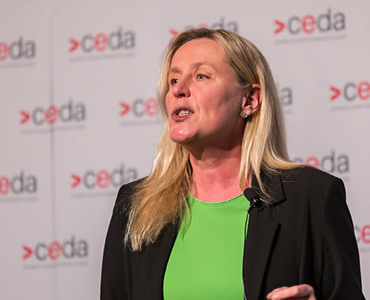Placing unconscious, gendered thought bias into the spotlight is one step organisations can take to achieving gender equality, according to VicHealth Leading Thinker and Harvard University Professor Iris Bohnet.
 Speaking at a CEDA event in Melbourne, Professor Bohnet said that raising awareness of gender inequality opens doors but does not actually solve the problem.
Speaking at a CEDA event in Melbourne, Professor Bohnet said that raising awareness of gender inequality opens doors but does not actually solve the problem.
“Simply raising awareness of unconscious bias is likely not going to be enough to in fact move the needle, we have to do something a bit more drastic,” she said.
“We use more rigour in our marketing departments than in our HR departments.
“Data suggests we would be very well advised to use that rigour in our people management.
“Recently I looked for an icon for ‘expert’ and I chose some random webpage where there were 224 icons for experts and exactly six were of women.
“The world is full of patterns, because we don’t see many female venture capitalists we don’t associate venture capitalists with women.”
Professor Bohnet said that often organisations are blind to biased demographic characteristics of resumes when hiring.
She said that only through understanding this are organisations able to move from intentions to actions on reducing gender inequality.
“It is very hard to debias mindsets and not a great strategy to always try to ‘fix’ the women,” she said.
“A few years ago Coca Cola realised men were not buying diet coke, that could be because of lots of reasons but they realised through rigorous research that ‘diet’ was not a male word, so they introduced coke zero.
“Companies have realised that there are male and female words, if they can do it we thought we could do this for job advertisements.
“You can use these decoders not just in job placements but you can use them in your letters of recommendation.
“When you use the decoder you will see how likely we are to use gendered language and are much more likely to highlight her collaboration skills and his assertiveness.”
Professor Bohnet said that gendered bias extends not only in hiring but in career advancement.
“Normally when we work with companies the first thing we do is a diagnostic to try and understand what’s broken, why do we have the gender pay gap,” she said.
“Is it because you don’t hire women? Don’t promote women? Or is it because women are more likely to leave?
“We found that the gender gap is all in promotions.
“We looked at something that we now call ‘performance reward bias’.
“Imagine an X axis, people’s performance ratings, and they are from one to five with five being the best, and a Y axis, the likelihood of being promoted.
“What you would expect is that there is some positive correlation.
“If you’re a one you should get the signal that you should leave the company, if you’re a five you probably have a better chance of being promoted.
“Then we looked at gender differences and those promotion rates.
“If you’re a low performer there’s no gender difference, if you’re in the middle there’s not much of a difference but if you’re a high performer, the fact that you don’t see a red dot, representing women, is not a mistake but in fact turns out performance ratings were not correlated with promotions for women at all.
“We created something that we call the gender promotion ratio where we show managers their track records on promoting men and women in comparison to the available pool.
“Turns out just knowing what you’ve done in the last five years is enough for these managers to do better, which of course suggests that much of this happens unintentionally and inadvertently.
“Diverse teams out perform homogenous teams, so numbers do matter.
“Do not underestimate the importance of seeing is believing.
“That’s not just ‘we have to have 50 per cent women in leadership roles’ but it means that these role models have to be visible and have to be available to people who might aspire to those roles.”
Event presentations
Professor Iris Bohnet, Harvard University
MP3
Moderated discussion
MP3
Delegate handout
PDF